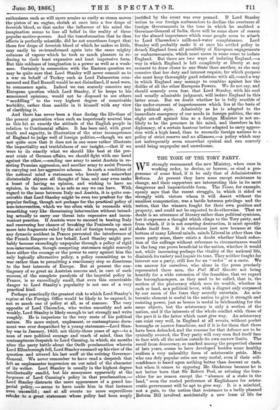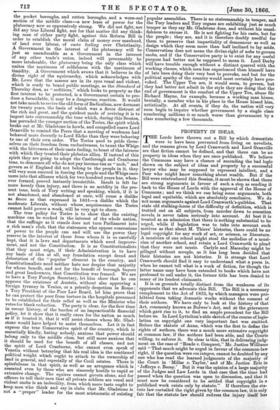THE TONE OF THE TORY PARTY.
WE strongly recommend the new Ministry, when once in working order, to devise, or borrow, or steal a pro- gramme of some kind, if it be only that of Administrative Reform. At present they have none except resistance to change, and their supporters are interpreting this in its most dangerous and impracticable form. The Times, for example, openly says that the recent struggle, in which it sided so strongly with victors whom it will desert without the amallest compunction, was a battle between privilege and the nation, that the winners, fought for their own position and property, and could not be expected to do otherwise. That no doubt is an utterance of literary rather than political cynicism, but it expresses a thought which clings to the Tory party, and from which, if it is not courting destruction, it must speedily shake itself free. It is victorious just now because at the bottom of many Liberal minds, minds Liberal in other than the mere party sense, there exists a doubt whether blank reduc- tion of the suffrage without reference to circumstances would in the long run prove beneficial to the nation, whether it would not, while increasing perhaps the vitality of the national life, diminish its variety and impair its tone. They neither fought for interest nor a party, still less for an " order " or a caste. We can answer for ourselves, who alone in the press precisely represented these men, the Pall Mall Gazette not being heartily for a wide extension of the franchise, that we regard the boroughmongers, as they used to be called, that is, the section of the plutocracy which uses its wealth, whether in cash or land, as a political lever, with a disgust only surpassed by our scorn of the fears they secretly entertain. An aris- tocratic element is useful in the nation to give it strength and resisting power, just as breeze is useful in brickmaking for the same objects, but the aristocracy is only a section of the nation, and if the interests of the whole conflict with those of the part it is the latter which must give way. An aristocracy can exist very well, in England at all events, without pocket boroughs or narrow franchises, and if it is for them that these have been defended, and the reasons for that defence are to be cynically avowed, the Tory party will very soon fluid itself face to face with all the nation outside its own narrow limits. The recoil from democracy, so marked among the propertied classes of late years, seems to have developed besides some healthy realism a very unhealthy form of aristocratic pride. Men who can defy popular cries are very useful, even if their self- confidence is based upon nothing better than descent or cash, but when it comes to opposing Mr. Gladstone because he is not better born that Sir Robert Peel, or ref using the fran- chise for no reason except the "absence of a stake in the land," even the rooted preference of Englishmen for aristo- cratic government will be apt to give way. It is a mischief, not a gain, to the nation that resistance to a badly planned Reform Bill involved accidentally a new lease of life for
the pocket boroughs, and rotten boroughs, and a worn-out section of the middle class—a new lease of power for the plutocracy now so oppressively strong. We did not fight, nor did any true Liberal fight, nor for that matter did any think- ing man of either party fight, against this Reform Bill in order to establish the moral claim of money over manhood,
of land over labour, of caste feeling over Christianity, A Government in the interest of the plutocracy will be just as unendurable as a Government in the interest of any other trade's union, indeed will presumably be more intolerable, the plutocracy being the only class which unites the maximum of selfishness with the maximum of timidity. A Government which avows that it believes in the divine right of the squirearchy, which acknowledges with Mr. Lowe that the masses are in its eyes venal and violent, which is ready to brand public meetings, as the Standard of Thursday does, as "seditious," which looks to property as the first interest to be protected, is a Government certain to pro- duce a formidable, it may be a dangerous, reaction. It would not take much to revive the old form of Radicalism, now dormant for twenty years, the basis of which was a fierce distrust of the rich and great, and the quickest mode of reviving it is to import into statesmanship the tone which, during this Session, has pervaded the younger section of the Tories, the spirit which broke out at Mr. Gladstone in howls, and compelled suave Lord Granville to remind the Peers that a meeting of workmen had behaved more decently to Lord Elcho than they were behaving to one of their own order. The Tories vsed to pride them- selves on their freedom from exclusiveness, to taunt the Whigs with the bitterness of their caste feeling, to boast of the fairness with which they treated their plebeian allies. If instead of this spirit they are going to adopt the Castlereagh and Cranborne tone, to denounce all who do not pay income-tax as "mob," and govern as if England did not belong to the people in it, they will very soon succeed in forcing the people and the Whigs once more into that alliance which for two hundred years has, when- ever formed, proved instantly irresistible. Insult is felt far more keenly than injury, and there is an acridity in the pre- sent tone, both of Tory writing and speaking, which, if it is not abandoned, and abandoned at once, will rouse a dislike as fierce as that expressed in 1831—a dislike which the moderate Liberals, without whose, acquiescence the Tories cannot hold power a week, will be very apt to share. The true policy for Tories is to show that the existing machine can be worked in the interest of the whole nation, that the suffrage as it stands does not tarn Parliament into a rich man's club, that the statesmen who oppose concessions of power to the people can and will use the power they reserve in the interest of those from whom it is so carefully kept, that it is laws and departments which need improve- ment, and not the Constitution. It is as Constitutionalists that they must reign, if their Administration is to have any basis of idea at all, any foundation except dread and detestation of the " popular " element in the country, and Constitutionalists need neither hate nor despise that majority for whose benefit, and not for the benefit of borough buyers and great landowners, that Constitution was framed. We are to have a Tory Foreign Secretary, let him show that he can approve the existence of Austria, without also approving a foreign tyranny in Venice, or a priestly despotism in Rome ; a Tory President of the Poor Law Board, let him prove that he can protect the poor from torture in the hospitals presumed to be established for their relief as well as the Minister who votes for blank reduction. The party is clear, for the first time in recent history, of the burden of an impracticable financial policy, let it show that it really cares for the nation as much as if it trusted it, that it will assist classes whom Mr. Glad- stone would have helped to assist themselves. Let it in fact express the true Conservative spirit of the country, which is essentially kindly, hating nobody, anxious that power should belong only to the middle class, but still more anxious that it should be used for the benefit of all classes, and not the spirit of Lord Cranborne, who cannot even speak of Venetia without betraying that his real idea is the continued political weight which ought to attach to the ownership of land in general, and especially of the Cecil estates. There is spitefulness in that spirit, as well as an arrogance which is resented even by those who are sincerely hostile to rapid or extensive change. The squires cannot govern alone, and for officers to tell their men that all private soldiers are venal and violent snobs is an imbecility, from which mere taste ought to keep men who think and say in clubs that Mr. Gladstone is not a "proper" leader for the most aristocratic of existing popular assemblies. There is no statesmanship in temper, and the Tory leaders and Tory organs are exhibiting just as much temper as they say Mr. Gladstone does, and without his unsel- fishness to excuse it. He is not fighting for his caste, but for the people ; they are, and it is therefore doubly needful for them to preserve that impartiality of demeanour as well as design which they seem more than half inclined to lay aside. Conservatism does not mean the divine right of nobs to govern snobs, and if the Conservative party is to exist for any useful purpose had better not be supposed to mean it. Lord Derby will have trouble enough without a distinct quarrel with the working classes, which men less experienced than himself have of late been doing their very best to provoke, and but for the political apathy of the country would most certainly have pro- voked. The Upper Ten are, it would seem, to govern, but they had better not admit in the style they are doing that the end of government is the comfort of the Upper Ten, abuse Sir Richard Mayne, for example, because a working man hisses, brutally, a member who in his place in the House hissed him, artistically. At all events, if they do, the nation will very soon begin to inquire whether government by a single class numbering millions is so much worse than government by a class numbering a few thousands.































 Previous page
Previous page